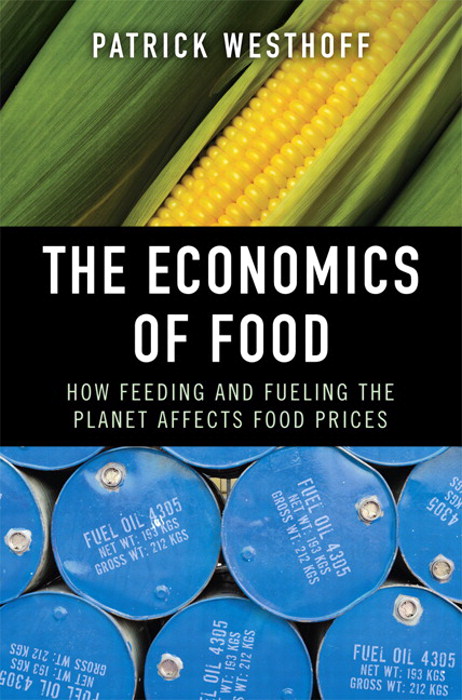It wasn’t too long ago that the ethanol industry experienced the perfect storm…high energy prices, high corn prices and low ethanol prices. Also during this time food prices rose. Why? While the reality was that high energy prices were a major factor (oil was more than $15o per barrel at its peak), ethanol was blamed over and over again as the major culprit. Today, research papers are still being published saying that ethanol was not the main offender; yet the debate is still active. So this week, I read the book, “The Economics of Food,” by Patrick Westhoff. To disclose Westhoff’s background, he grew up on an Iowa farm, has a Ph.D. in agricultural economics from Iowa State University and currently co-directs the Food and Agricultural Policy Research Institute (FAPRI) at the University of Missouri.
 Westhoff acknowledges very quickly that ethanol did have a role in rising food costs.”Biofuels played an important role in the rise and fall of food prices between 2005-2009, but other factors were also at play. Anything that affects the amount of food produced or consumed in the world will have some impact on food prices.” After explaining what some of those other factors are, he writes, “Thus, a first rule of thumb: Increasing biofuel production raises the price of food.” (Author’s italics.)
Westhoff acknowledges very quickly that ethanol did have a role in rising food costs.”Biofuels played an important role in the rise and fall of food prices between 2005-2009, but other factors were also at play. Anything that affects the amount of food produced or consumed in the world will have some impact on food prices.” After explaining what some of those other factors are, he writes, “Thus, a first rule of thumb: Increasing biofuel production raises the price of food.” (Author’s italics.)
Westhoff presents both sides of the “food and fuel” debate in his book and says that in certain arguments, both sides are right (the proponents and opponents). He then stresses that biofuels did not play as large of a role in rising food prices as detractors claim, but he also said that biofuels played a larger role in food prices that biofuels supporters acknowledge. After he lays out the true impact of biofuels and food prices, he then lays out some possible scenarios for the future.
He writes that if biofuels’ share of the world’s grain, oilseeds and sugar remains close to where it is today, biofuel production will likely fade as a major concern in world food markets. However, he says, if biofuels production grows in the year’s and decades to come, it will matter how biofuels are produced.
His assessment will surely put many people up in arms, but before you get to upset, he spends the remainder of the book explaining other major factors that affect food prices including: energy prices, government policies, weather, economic growth and changing diets, the value of the U.S. dollar, and speculation. Now, I’m not an economics person, but Westhoff does do a very good job of explaining how each one of these factors works alone and in tandem to affect food prices.
He ultimately offers three alternative futures and speculates on how they would affect food prices but concludes that he “doesn’t have a crystal ball,” but rather that his goal was to help the reader better understand some important aspects of world food markets. In this he achieved his goal.

